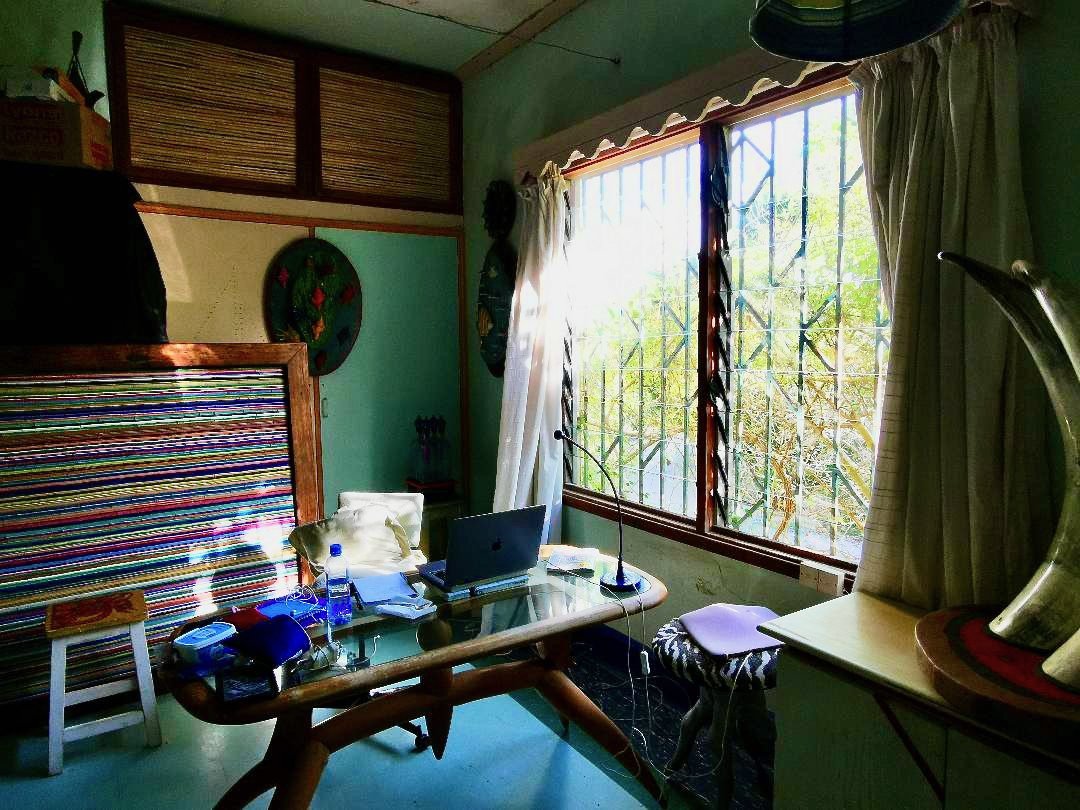
The Blade of History
Storms come in the morning. I am out running by six a.m., twenty minutes before dawn at this squally time of year three degrees below the equator. So much happens at that time of the day: birds, lizards, monkeys. Everything is alive.
I cannot identify this bird who calls in the garden. He is very shy. All animals are shy until they are not. Today a feral cat killed a male agama lizard on the steps. She broke his back. His eyes were at half-mast, an expression of weary resignation.
A tray of porcupine quills lies on the bed. On the table are two huge Ankole cattle horns bought in Kampala. A ceiling panel is collapsing, a crack spiders across the wall, a mirror made out of msufi, a hardwood, peers at me with its cyclops eye. Two agama lizards, who I call maxi and mini, both bitumen black, live with me here, along with a male plated lizard. One day in January I found a bark snake under the bed.
The days wash over me. I don’t feel much like writing. This room has become the world; the world has shrunk to the dimensions of this room. Just another paradox. They are multiplying. Chief among them: where has my country gone? It has been stolen from me.
At the moment there is no way for me to get back, no sleek white cylinder flying me to London during the long Sahara night. I am in a state of siege, one of the two options open in narrative apparently: the quest, the siege. We know which is more vital and galvanising, but as it turns out life is mostly lived in some sort of state of arrest.
The Kusi monsoon has set in. Cue cloud television over the Indian ocean, vast roiling cylindrical structures that scrape the troposphere. The ocean is fringed by reefs and coral islands where urchins, reef fish, molluscs and dugongs nudge through kelp forests. In the warm, turbid waters are porpoises and sailfish, yellowfin tuna, billfish, sea-sponges, starfish, sea turtles, lanternfish, shuffling clever octopi. The land is buffered by mangrove thickets on their ballerina pointe roots, tip-toeing above the low-tide line.
This coast is where I come to evade the blade of history. Slaves were taken from the coast by Arab slavers and exported to Iraq in the 9th century. The Yemeni and Omani traders called this coast the land of the Zinj; in the language of the time Zinj meant black. History only pretended to forget the coast, it cast its lazy Gorgon’s eye elsewhere for one, two, three centuries.
These are the books propping up my laptop for endless Zoom meetings for my university job: A Field Guide to the Mammals of Africa including Madagascar. Birds of East Africa. A Guide to the Seashores of Eastern Africa and the Western Indian Ocean Islands. I cannot remember what happens in these meetings, because nothing happens. Afterwards I cannot remember what anyone has said. I would like to be able to abandon the meetings and open these books and read about terebralia and the lesser galago and the Narina trogon, but I would lose my job I suppose. I would lose something I have not yet lost.